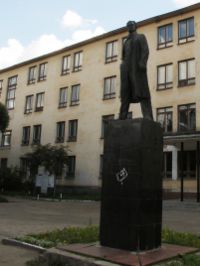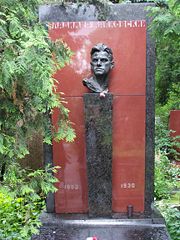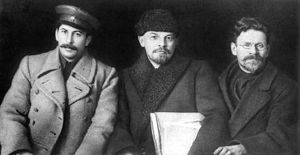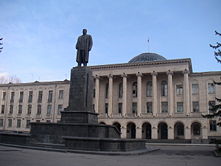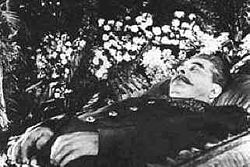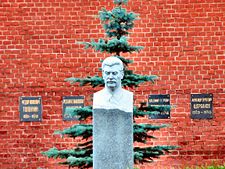ARCHIVES: Stalin, the poet, and life’s choices
“I regard class differences as contrary to Justice.” (Albert Einstein in a personal statement of his credo.)
“The Russians have proved that their only aim is really the improvement of the lot of the Russian people.” (Albert Einstein in his 1934 refusal to sign a petition condemning Stalin’s murder of political prisoners.)
“Any government is evil if it carries within it the tendency to deteriorate into tyranny. The danger … is more acute in a country in which the government has authority not only over the armed forces but also over every channel of education and information as well as over the existence of every single citizen.” (Albert Einstein in a speech to Russian scientists in support of democratic socialist ideals and criticism of untrammeled capitalism.) (1)
BY GAITHER STEWART
(Dateline: Rome, 20 August 2008)
I have chosen to set out on this trip back in time to Joseph Stalin from the six-meter tall statue of the revolutionary writer, Vladimir Mayakovsky.
)
But first, the poet Vladimir Mayakovsky.
The Cubo-Futurist poet of the Russian Revolution, admired, pampered and promoted by Stalin and some Russian revolutionary leaders, mistrusted and criticized by others, apparently shot himself in his office one day in April in 1930 in Moscow. His death ultimately became the subject of speculation for historians and mystery thriller writers alike: suicide or murder? Both versions are tempting and facile: either he committed suicide because of putative disillusionment with the revolution or he was murdered by Stalin. Or perhaps it was a more mundane question of his love life.
The poet with his pre-eminent love interest, Lilya Brik, who, unfortunately, was married.
Mayakovsky moved with his family to Moscow in 1906 from Georgia (Gruzia) where both he and Stalin were born, he Russian, Stalin, Georgian. Legend has it that he was a member of the Bolshevik Party at age 14, a messenger and distributor of leaflets for which he was arrested before the Revolution. He allegedly wrote his first poem in solitary in Butyrki Prison when he was 16. Then, while studying art he published in 1912 together with a group of avant-garde painters a Futurist manifesto entitled “A Slap In the Face of Public Taste” which demanded that earlier writers such as Pushkin and Tolstoy be thrown overboard. Fiery eccentric Mayakovsky became the star and the legend of the revolutionary period because of his booming voice, exciting reading, showman abilities and the revolutionary idea in his work.
…grab stones, bombs, knives, whatever you can find and those of you who have no hands
hit with the forehead. March you oh hungry ones
Crooked,
Skinny, dirty, full of parasites
March!
During the Bolshevik coup in Petrograd, Red sailors marched on the Winter Place chanting one of Mayakovsky’s slogans: Eat pineapples, chew on quails, Your last day is coming, bourgeois!
Mayakovsky was active in many facets of agitprop on behalf of the revolution. This (left) is one of the posters he designed.
Left March, his poem of 1918 about the proletarian courage, discipline and optimism of those engaged in the struggle against counter-revolution, was typical of his lyrical poetry, clear and simple, fully intelligible to the masses and admired by Lenin and soon by Stalin. A newspaper wrote at the time that when with his strong, powerful voice resounding through the whole square, he read Left March, the whole square repeated his verse:
‘The Commune will never go down.
Left!
Left!
Left!’
Left!
Left!
Left!’
The poet of the Revolution scorned the official Proletarian Culture establishment, Proletkult. Producing posters and placards and slogans for the revolutionary government, he came to believe he embodied the Revolution. In his many films, none really successful, and in his greatest poetry, his major theme was the proletariat. He traveled over the world from Paris to Mexico (to visit the Communist Diego Rivera) and to the USA where he read his revolutionary works. In one poem he boasted of the bewilderment and fright his red Soviet passport created in the world of those times when immigration officials touched it as if it were a bomb.
______________________
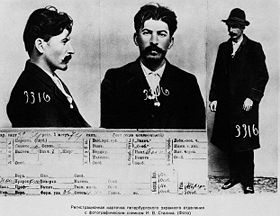 LEFT: Czarist police mugshot and filecard for Stalin. A man of demonstrated courage. Stalin robbed banks at gunpoint to fund the Bolshevik cause. As ruler of the U.S.S.R. from 1929 to 1953, Joseph Stalin was in charge of Soviet policies during the early phase of the Cold War. He adopted the name Stalin, which means “Man of Steel,” while still a young revolutionary.
LEFT: Czarist police mugshot and filecard for Stalin. A man of demonstrated courage. Stalin robbed banks at gunpoint to fund the Bolshevik cause. As ruler of the U.S.S.R. from 1929 to 1953, Joseph Stalin was in charge of Soviet policies during the early phase of the Cold War. He adopted the name Stalin, which means “Man of Steel,” while still a young revolutionary.
In 1925, he had criticized suicide in a poem dedicated To Sergey Yesenin (whom he did not particularly admire) when that revolutionary poet committed suicide: In this life, to die is not so difficult, To make life is considerably more difficult. Active in diverse fields and the mouthpiece of the Proletariat till the end, Vladimir Mayakovsky shocked everyone when suddenly, surprisingly, on April 14, 1930 he shot himself in his Moscow office. He left this note:
“As they say, the incident is closed. The love boat wrecked by daily life. I’m all even with life and nothing would be gained by listing mutual hurts, troubles, and insults. This is not the way I recommend but there is no other way out. Don’t think I’m a coward. Seriously, it could not be helped. Lili, love me”
‘Mayakovsky was and remains the best and most talented poet of the Soviet epoch’ and that ‘indifference to his cultural heritage is a crime.’(2)
CHOICES
LEFT: Stalin, TIME “Man of the Year” for 1943. The anti-Nazi alliance between the US and the USSR in WWII momentarily suspended the constant barrage of anti-communist and anti-Soviet propaganda throughout the Western media. Political truth—for the mainstream press—is what the State Department says it is.
In EITHER/OR Kierkegaard idealized the role and life of a poet as despair. The poet sees the ideals but he must flee from the world in order to rejoice in them and he cannot remain unaffected by the caricatures of these ideals all around him. Similarly also the greatest political idealists, those whose ideas can change the world just as every poet aspires to do, experience extreme despair and doubt. I suspect they too quake in doubt and fear, as Stalin down in the Kremlin must have done. Their passions are perhaps those of the poet even though their mission requires a cruelty—or ruthless determination—foreign to the poet. Tolstoy wrote that ordinary men too do the things they do, perhaps making history without knowing what they are doing. Tolstoy believed that the force that took God’s place and moved history was something great but incomprehensible, inaccessible, arcane.
Only the truly arrogant pass through life believing they have always made real choices.
I could hardly believe it! With the idea of political choices in mind I wrote in Yahoo Search the words “American Left” with the intention of investigating the reasons behind the socio-political choices we make in life. And what comes up? A long list of hate articles about even the mere idea of Left. Especially Socialism. And collectivism. From Rightwing watch. People for the American Way. One wrote “The Left is brainwashing us of our patriotism!” (sic)
Such knee-jerk hate reactions make choice seem like a rare luxury. A chimera.
LEFT: The “Big Three” at the Yalta Summit, in 1945.
completely his own path and maybe there is less freedom of will in us than we like to believe. Tolstoy and Stendahl among others believed that everything is predetermined by the course of things.
STALIN AND THE POET
Stalin is my major concern here. My conclusion is that I have been had in his regard. I have been brainwashed both by western propaganda—mostly of the Anglo-Saxon variety— and biased historians of all nationalities and ideologies. Now my eyes are more open. My receptors are up and searching. I read my history. I note that Oliver Cromwell, Napoleon and even Robespierre have been rehabilitated. Today Napoleon is more hero than scoundrel.
Most certainly Stalin, whose positive accomplishments survive, should not be classed with Hitler, whose counter-revolution destroyed his own nation in a delirium of madness, and whose social agenda, from the start, was reactionary, racist, and ignoble. Though Stalin like Hitler was ruthless in eliminating opposition and built a totalitarian state, he succeeded in creating a new social order and, at an enormous price, made a modern nation of what had been labeled a country of savages. (3) Moreover, while Hitler was engaged in all his Aryan gibberish, Stalin’s goal, however distorted by Stalin the dictator, was and remained the birth of a new society based on equality. Social justice. Surely even in deeply capitalistic and indoctrinated America we remember what that is all about? (4)
I don’t want to get started on my views of historians here since the task of reassessing Stalin will fall to them, the young historians capable of eluding the great brainwash. The task they face today is enormous. There are always many reasons to doubt the truth in history. Who organized the Cold War? Why the Korean War? Who killed John F. Kennedy and Bobby? How did either of the Bushes become President of the United States? What is the full story behind the towers of the World Trade Center? How and why did the United States of America go wrong?
As Virginia Wolfe said, “Positions have been taken, myths have been made.”
Stalin, Lenin and Kalinin, in 1919. All three at the core of old Bolshevism.
Here let’s list some of the positive accomplishments that outlived Stalin, some also right into Russian capitalism today. Many of my references are found in the biography, Stalin, by the historian Isaac Deutscher, who cannot be accused of leanings toward Stalinist Communism.
•••
- Whatever his aberrations and “crimes”, Stalin was a revolutionary who introduced a new social organization in contrast to capitalism.
- Stalin was the guardian of Marxist doctrine.
- Many historians agree that Stalin was a Leninist as he himself claimed and a true follower of his master, the icon of Soviet Russia. Therefore, one speaks of Marxism-Leninism-Stalinism as a continuum.
- Stalin pragmatically forced through Socialism In One Country when it became obvious that world revolution was not imminent.
- Stalin modernized Russia which until the Revolution was basically more Asiatic than European.
- Stalin made a nation of a great potpourri of peoples.
- Under Stalin Russia’s industry which in 1930 was inferior to any medium-sized European country by the late 1940s had become Europe’s first industrial power and for long the second in the world.
- The whole nation was sent to school, as education boomed.
- In the minds of Russians, Stalin led the entire nation to defeat Nazism in defense of the homeland against the foreign invader. The victorious war proved Stalin right in his forced, ruthless, rapid industrialization of the 1930s.
- Stalin created the belief of the USSR as defender of the oppressed of the world, while leading the struggle against counter-revolution.
- After WWII and its enormous cost in life (over 27 million dead, practically an entire generation) and the destruction of Russia’s productive industry Stalin ruthlessly forced a hungry people dressed in rags to “catch up with the USA”, to achieve greater production goals and to lay the foundations for Russia’s nuclear efforts.
Under Stalin Russian society was so dramatically changed that even after today’s political restoration and the return of capitalism Russia retains much of the heritage of Stalinist Soviet Union. (4)
LEFT: Monument to Stalin in Gori, Georgia.
STALIN’s “TERROR”
Robespierre’s “reign of terror” has quietly subsided into history books. Robespierre has found his place in history, comfortable and acceptable. After all, it was revolution. (The question is still debated among historians and political observers whether the French revolutionaries or counter-revolutionaries committed greater crimes. Robespierre himself was executed in twenty-four hours without the benefit of a real trial, with his jaw literally blown away by a musket shot, and without receiving any form of medical care. And both the Thermidoreans and royalist restaurationists were fierce in their vengeance against the Jacobins and sans culottes.)
One of many adulatory posters produced during the war years, when the Cult of Personality was in full sway. Ironically, although Stalin did not directly discourage such sycophancy, he showed on a number of occasions that he had a jaundiced view of the practice.
But Stalin? Well, he is still pretty fresh. Just barely off the books of current political news. And still powerfully influential on the legitimacy of the system he’s so clearly identified with: communism, capitalism’s main ideological alternative, indeed its nemesis.
The question we should ask is why did he do it? Why the putative cruelty? Terror for terror’s sake? Like gassing five million Jews? Of course not. Stalin was a revolutionary, aiming at a better life for Russia’s peoples. Otherwise, why all that pain and suffering, and intrigue and duplicity and betrayal of his closest comrades and friends? Only a bad faith western historian could portray the Stalinist period in only one color. If one must accuse, then better to zero in on Brezhnev and Stalin’s heirs, those who distorted a revolution into the grayest of useless and obtuse bureaucracies.
lying in state in the House of Trade Unions in Moscow (1953)
Deutscher notes that Stalin didn’t need scapegoats for the enormous economic difficulties involved in industrializing backward Russia. Stalin’s real motives were to wipe out all possible alternatives to his “socialism in one country” and the accompanying rapid industrialization. That is, he crushed opposition. And his era was rich in alternative ideas. From Trotsky on the far left to all the others on the right. Stalin suspected—with plenty of reason, as he understood class dynamics quite well and the nature of the capitalist cliques that confronted him— that the West was still plotting against the Soviet Union as it had done from the time of the Revolution. Western appeasement of Nazi Germany and its support of the revival of German militarism filled him with foreboding. Was the West not instigating Germany against Russia? Today stories of America’s close involvement with Nazi Germany, that of the Bush family for example, were not the fruit of Stalin’s paranoia. It was brutal reality. For Stalin, Germany’s crushing of the Tsar’s primitive armies in World War I was a recurrent nightmare.
Stalin’s real problems concerned the opposition capable of forming an alternative government. Not one alternative, but many. His method was to destroy them. In those times, it was easy—especially in a country convulsed by recent counter-revolutionary action, war and famines—to equate political opposition with counter-revolution, Stalin’s major internal problem. No less than organized political opposition has been eliminated in the USA and today more and more in Europe in general, Stalin’s goals were the same though his methods and style were much less subtle, even if his ultimate goals were at least defensible, which in our case, the utter triumph of a fascistic plutocracy, they are not. After all, wittingly or unwittingly, what has been the not always subtle policy of the US political leadership for 232 years if not to create what is in effect a one-party system, thus far making impossible the emergence of an alternative political system, i.e. socialism?
Kremlin Wall Necropolis
Revolution is not a tea party for young maidens. It’s not, as Mao suggested, a blacktie sitdown dinner. Revolution is dramatic, drastic, sweeping change, not a time for subtleties. Revolutions in human affairs often occur with the suddenness and blind force of earthquakes, once the underlying tectonic plates have come to the point where the friction and cumulative tensions can no longer be controlled. Counter-revolution from within or without was a real danger. The first so-called show trials of Kamenev and Zinoviev, both historic Bolshevik leaders, took place a few months after Hitler’s armies marched into the Rhineland. The last trials of Bukharin and Rykov coincided with Nazi occupation of Austria. Germany with Western help was rearming and taunting and testing the world. Western appeasement and aid to Nazi Germany duly preoccupied Stalin who had come to believe that the West was sicking Hitler on the hated Soviet Union. He had to dread the prospect of a single-handed war against Germany. He must have seen such a war as the end of the Soviet experience and his own personal end. He saw an opposition using a new war to its advantage to crush him and his Socialism In One Country. In such circumstances the leaders of the opposition on left and right would have been capable of overthrowing Stalin. Therefore the opposition had to die as traitors. Moreover, the purges then generated real opposition, thus leading to more and more terror, as in the French Revolution. Apparently there was a real conspiracy among military leaders. A genuine plot? A conspiracy perhaps?
Deutscher notes that “quite a few non-Stalinist sources maintain that the generals did indeed plan a coup d’état and did this for their own motives, and on their own initiative, not in compact with any foreign power.” It was to have been a palace revolt in the Kremlin, culminating in the assassination of Stalin.” The plot was uncovered and Stalin hardly hesitated in the elimination of one-fourth of the officers’ corps.
From that point there was no more rebellion against Stalin as happened to Robespierre. There was no Thermidor for Joseph Stalin, born Vissarion Ivanovich Djugashvili. The new Soviet nation hardly changed as a result of the purges. Instead it organized and in defense of the homeland defeated Hitler’s until then invincible armies.
For many of the above reasons, western Communists did not desert Communism and the home of the world revolution until nearly 20 years after Stalin’s death. Stalin got some of the blame but far from all. If anything the grayness of the bureaucratism of the Brezhnev years and the crushing of dissension and rebellion in East Europe, especially in Prague 1968, finally led to the end of “the age of innocence” of many Western Communists.
While Mayakovsky’s lonely statue still stands on Triumphalnaya Square and many people still call it Mayakovskaya Ploschad, the poet is rather forgotten.
On the other hand, though monuments to Stalin have been pulled down across Russia [and new ones are now being proposed], his shadow nonetheless hovers and haunts modern Russia and like the ideals of the French Revolution many of his achievements survive making Russia great and particular and its capitalism dicey … to say the least.
=======
NOTES
Einstein’s views on other issues, including socialism, McCarthyism and racism, were controversial (see Einstein on socialism). In a 1949 article, Albert Einstein described the “predatory phase of human development”, exemplified by a chaotic capitalist society, as a source of evil to be overcome. Einstein was very much involved in the Civil Rights movement. He was a close friend of Paul Robeson for over 20 years. Einstein was a member of several civil rights groups (including the Princeton chapter of the NAACP) many of which were headed by Paul Robeson. He served as co-chair with Paul Robeson of the American Crusade to End Lynching. When W.E.B. DuBois was frivolously charged with being a communist spy during the McCarthy era while he was in his 80s, Einstein volunteered as a character witness in the case. The case was dismissed shortly after it was announced that he was to appear in that capacity. Einstein was quoted as saying that “racism is America’s greatest disease”.
[16] to President Roosevelt (dated August 2, 1939, before World War II broke out, and probably written by Leó Szilárd) encouraging him to initiate a program to create a nuclear weapon. Roosevelt responded to this by setting up a committee for the investigation of using uranium as a weapon, which in a few years was superseded by the Manhattan Project.
Demyan Bedny). When, in 1935, Lilya Brik wrote to Stalin about this, Stalin wrote a comment on Brik’s letter:
Yezhov, please take charge of Brik’s letter. Mayakovsky is still the best and the most talented poet of our Soviet epoch. Indifference to his cultural heritage is a crime. Brik’s complaints are, in my opinion, justified…” (Source: Memoirs by Vasily Katanyan (L. Yu. Brik’s stepson) p.112)
Four Winds movement there.[2] He was also an influence on the writer Valentin Kataev. The well-known phrase “Lenin lives, lived and will live” come from his elegy “Vladimir Ilyich Lenin”.
War in the Vendée, http://en.wikipedia.org/wiki/Revolt_in_the_Vendée. Eds.
[82] This is seen by some as a return of Stalin’s cult. In Krasnoyarsk, it has been decided to rebuild a communist-era memorial complex dedicated to Josef Stalin.[83] Also, a new statue of Stalin is to be erected in Moscow, “returning his once-ubiquitous image to the streets after an absence of four decades, a top city official said yesterday”, as reported by The Scotsman.[84]
Name of Russia. Historical Choice 2008” in which 178,881 out of 1,453,390 voted for him.[86]
See also:
Stalin: A New History, by Sara Davies and Jim Harris
• Some Remarks On Yet Another Anticommunist Article Concerning Communist Solidarity With The Spanish Republic In The Spanish Civil War //
• A review of Spain Betrayed: The Soviet Union in the Spanish Civil War by Ronald Radosh (Editor), Mary Radosh Habeck (Editor), Grigory Sevostianov (Editor). Annals of Communism series. Yale University Press, June 2001.
an interview with Prof. Grover Furr
